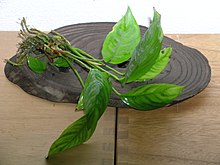Anubias heterophylla
| Anubias heterophylla | |
|---|---|
 |
|
| Scientific classification | |
| Kingdom: | Plantae |
| (unranked): | Angiosperms |
| (unranked): | Monocots |
| Order: | Alismatales |
| Family: | Araceae |
| Genus: | Anubias |
| Species: | A. heterophylla |
| Binomial name | |
|
Anubias heterophylla Engler |
|
| Synonyms | |
|
A. congensis N.E. Brown |
|
A. congensis N.E. Brown
A. congensis var. crassispadix Engler
A. affinis De Wildeman
A. engleri De Wildeman
A. bequaerti De Wildeman
A. undulata nomen nudum
Anubias heterophylla is a species belonging to the Aroid genus Anubias. It was first described scientifically by Adolf Engler in 1879.
The following names are synonyms of A. heterophylla: A. congensis N.E. Brown, 1901, (including A. congensis var. crassispadix Engler, 1915), A. affinis De Wildeman, 1907, A. engleri De Wildeman, 1907, A. bequaerti De Wildeman, 1922, and A. undulata (trade name).
Cameroon, Equatorial Guinea, Gabon, Republic of the Congo, Democratic Republic of the Congo, and Angola (including Cabinda Province).
A. heterophylla has leaf blades that can be up to 38 cm long and 13 cm wide and are rather variable in form, ranging from elliptic/oval to lance- or spear-shaped. The leaf stems are generally longer than the blade and up to 66 cm long. The leaves are set on a creeping and rooting rhizome that is 5 to 17 mm thick. The spathe is 1.5 to 4.5 cm long and 2 to 4.5 times as long as wide, and has an up to 27 cm long peduncle. The spadix is 1.5 to 4.5 cm long and can be up to 2 times than the spathe. The upper part is covered with male flowers, of which the 4 to 6 stamens are fused into , with the thecae on its sides. The lower part of the spadix is covered with female flowers that are reduced to the ovary and stigma.
...
Wikipedia
